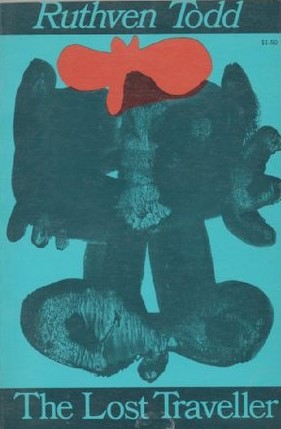 By RUTHVEN TODD (Dover; 1943/68)
By RUTHVEN TODD (Dover; 1943/68)
For those of you who like your horror tinged with undiluted surrealism, this hallucinatory account of a lost man is the book for you—or at least, it’s a book for you. I can think of several others that attempt a form of surrealistic fantasy similar to this one, all with arguably more success: THE EXPERIENCE OF THE NIGHT by Marcel Bealu, THE OTHER SIDE OF THE MOUNTAIN by Michel Bernanos, PHANTASTES and LILITH by George MacDonald. Still, THE LOST TRAVELLER is a unique and haunting piece of work with passages I know I’ll be a long time forgetting.
It’s the story of Christopher, a naïve young man stranded in a world where time appears to have been suspended, lorded over by a corrupt despot who enforces very stringent rules and metes out bizarre punishments to those who trespass. Christopher is given a particularly inexplicable penalty for his crimes: he’s ordered to capture a fabled bird called the Great Auk, despite the fact that such creatures are said to be extinct (the final surviving example having allegedly been beaten to death by ignorant fishermen).
Along the way Christopher sees and/or experiences many strange things, like uncut diamonds scattered in a parched desert; bleeding statues on the outskirts of a city that appears gothic and forbidding or quaint and provincial depending on how one looks at it; a winding corridor that leads to a padded cell; people with featureless white faces; and a shocking metamorphosis that concludes this puzzling tale in brutal and unexpected fashion.
THE LOST TRAVELLER was initially printed in a limited copy run back in 1943, with large portions of its content shorn (and subsequently lost forever) due to WWII paper shortages. Author Ruthven Todd, a sometime novelist (of the 1939 anti-fascist parable OVER THE MOUNTAIN, among others), renowned scientific historian and authority on William Blake, was apparently transcribing a series of dreams. The result is an authentically dreamlike account that utilizes Kafkaesque dissociation and illogic to achieve its effects.
THE LOST TRAVELLER hasn’t dated especially well, often reading like a watered-down science fictionish reworking of Kafka’s THE CASTLE. Todd’s lengthy descriptions of the sights his protagonist sees as he trudges through otherworldly landscapes tend to be surprisingly dry and uninspiring, lacking the imaginative fecundity the author appears to have been reaching for. But the prose, perhaps because of the heavy editing job, also has a tightness and compactness that even Kafka (who, literary genius or not, had a tendency to drone) lacked.
Plus, certain passages have a real elemental power, particularly the concluding transformation, a deeply unnerving bit of literary sorcery that ranks with the most psychotic imaginings of Salvador Dali or David Lynch (although it was probably lifted from the final stanza of Ovid’s METAMORPHOSIS). Despite its shortcomings THE LOST TRAVELLER has a way of lingering in the mind like the remnants of a particularly strange and vivid dream—or, more accurately, nightmare.
